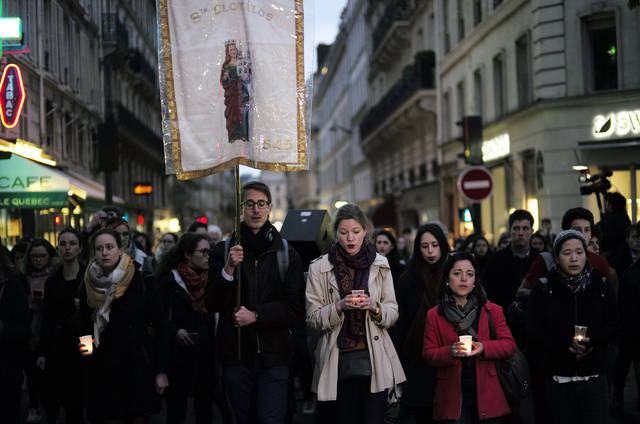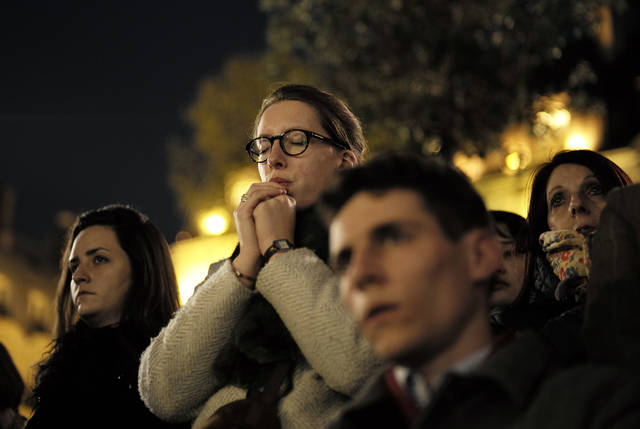PARIS — In Paris’ heart, a charred and gaping hole. But also a rallying cry.
The disfigurement of Notre Dame, the splendid cathedral that has watched over the French capital for centuries and is now a blackened wreck mourned around the globe, felt to Parisians like a body blow, as impossible to stomach as the eternal loss to New York of its Twin Towers, as unfathomable as the idea of Egypt shorn of its pyramids or London robbed of Buckingham Palace.
Which is why, even before the tears had dried and firefighters had extinguished the flames, the immediate, visceral imperative was to rebuild. Here’s money. Here’s wood. Donations poured in, from billionaires pledging hundreds of millions of euros to the more modest offerings of those who gave what they could spare.
A nation that for months of violent yellow-vest protests has been more divided than at any time since World War II suddenly found a shared mission in the ashes of disaster: Restore, for future generations, the gift of Notre Dame that previous generations handed down to us.
Experience says the new-found unity won’t last. It didn’t even after gunmen massacred 130 people at the Bataclan concert hall and other Paris sites in 2015 and killed 17 in the attack on satirical newspaper Charlie Hebdo and a kosher supermarket. Then, France shared a slogan, “Je suis Charlie,” in a similar way that it now shares the pain of Notre Dame.
Because the iconic cathedral’s suffering took precedence, immediately overpowering the political, social and economic splits that have consumed President Emmanuel Macron’s popularity and much of his time since November.
He’d been due to address the nation in a broadcast Monday night. Macron quickly abandoned that plan as the inferno feeding on ancient, tinder-dry wooden beams brought down the cathedral’s spire and cross-shaped roof. Whatever Macron had intended to say, the answers he’d prepared to respond to the unrest that has monopolized France’s attention, would have been lost amid the distress and prayers for Notre Dame, shared live by TV networks that abandoned their regular Monday night programming.
Instead, Macron spoke to the nation Tuesday. “What we’ve seen together in Paris overnight, it’s our ability to unite”, he said.
The front-page headline of the Liberation newspaper on Tuesday neatly captured how the fire has re-ordered the nation’s priorities.
“Notre Drame” — “Our Drama” — it read over a picture of the spire consumed by fire and smoke.
At his church in the west of Paris, the Rev. Guillaume de Menthiere felt the mood shift even as the cathedral was still spewing ash and smoke over the capital, as people filed in to pray at his church and to listen to its bells’ mournful tolling in solidarity for its big sister, Notre Dame.
The priest later said he was reminded of the aftermath of the Sept. 11 terror attacks, another tragedy when the world seemed to stop spinning and which drew French mourners back into churches that dot every town but which also seem to have lost much of their hold over France, with its fiercely guarded red line between church and the secular state.
In 2001, France wept for the United States and the attacks’ victims from multiple countries. “We are all Americans,” newspaper Le Monde famously said.
This time, thankfully, no one died in the fire that appears to have started somewhere in Notre Dame’s roof, which had been getting a much-needed repair job. But the outpouring of emotion from across the globe was still huge: “We are all French,” the world now appears to be saying.
Ordained in Notre Dame nearly three decades ago, de Menthiere was too overcome to sleep once he got home. At dawn, he rose and marshalled his thoughts into words. In the fire, he identified glowing embers of hope that France is coming together.
“During these hours of anguish, I seemed to sense that the old Gallic cockerel was awaking from its torpor,” he wrote in an email to parishioners that fellow priests quickly shared.
“A mysterious communion seemed at last to be reigning over the people of France which the months gone by had so sadly shown to be in pieces and fractured,” he added. “This unity that a presidential message, planned for that same night, would probably not have succeeded in rebuilding, was accomplished before our dumbfounded eyes by Notre Dame.”
Parisians who went to bed fearful that the cathedral would be reduced to rubble were relieved when they awoke to learn that its two landmark bell towers are still standing, saved by hundreds of firefighters, and that not all of its treasures have been lost.
Like the proud, crowing and indomitable Gallic cockerel, long a symbol of France and featured on coins, flag poles, the presidential Elysee Palace and even the uniforms of the national soccer team, the French have been reminded that, in despair, they share deep wells of fortitude.
“That is the history of the French. We divide very often around things that we argue about but we then get together,” said Bertrand de Feydeau, vice president of a conservation group that was among those collecting donations and within hours had already raised more than 11 million euros ($12 million) in gifts of all sizes.
“Because the French have a lot of heart.”
———
John Leicester has reported from France for The Associated Press since 2002.




